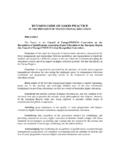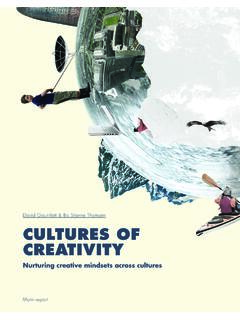Transcription of Labour exploitation in hand car washes
1 Rights Lab Labour exploitation in hand car washes A research report from the Office of the Independent Anti-Slavery Commissioner and the University of Nottingham's Rights Lab 2. Contents Acknowledgements 4. Foreword 5. Introduction 6. Research methodology 7. Summary of findings 8. Nature and scale of Labour exploitation in hand car washes (HCWs) 9. Overview of Labour exploitation in HCWs 9. Workers employed in HCWs 10. HCW owners/managers 11. Wages and terms of employment 12. Health, safety and work conditions 13. Accommodation style 14. Methods of control 15. Trafficking of workers 16. Link to other criminal activities 17. Labour exploitation in HCWs: a continuum of abuse 18. The costs of HCWs operating with exploitative Labour practices 20. Proposed solutions to tackle Labour exploitation in HCWs 21. Enforcement of regulations 21. Licensing and registering HCW operations 22. Engagement with workers 23.
2 Multi-agency collaboration 24. Public engagement 25. Conclusion 26. References 27. 3. Rights Lab and IASC. Acknowledgements This report was authored by Dr Akilah Jardine, Research Associate with the Rights Lab at the University of Nottingham, with assistance from Dr Alexander Trautrims, Associate Director of the Rights Lab, and Ms Emily Kenway, Labour Market and Private Sector Lead for the Office of the Independent Anti-Slavery Commissioner. We would like to extend our thanks to everyone who assisted with this research and provided their valuable time. This research was funded by the University of Nottingham's Rights Lab, a Beacon of Excellence, and the report was jointly published by the Rights Lab and the Office of the Independent Anti-Slavery Commissioner. 4. Rights Lab and IASC. Foreword Modern slavery is a brutal abuse, denying people their dignity, safety and freedom. It affects millions worldwide and thousands here in the UK.
3 If we want to see more victims rescued and more perpetrators behind bars, we need to know everything we can about the scale, causes, and consequences of modern slavery, and about strategies to combat it. Understanding the breadth and nature of modern slavery is an enormous challenge and needs to be supported by the best possible research and evidence. This report supports the aim expressed To date, numerous reports and in my Strategic Plan during my time as investigations have identified issues Commissioner of developing partnerships across the spectrum of Labour exploitation with academic and research institutions in the sector and under my tenure I was and promoting external high quality pleased to partner with the Rights Lab to quantitative and qualitative research investigate and analyse these findings so into modern slavery issues. A position that we can better understand the nature of greater understanding will empower of the problem and how to tackle it.
4 Evidence-led action to improve This report is an important piece in the prevention, justice and victim care. puzzle of eradicating modern slavery To support the development of high from British high streets and identifying quality research, the Office of the how ethical hand car washing businesses Independent Anti-Slavery Commissioner might operate. has partnered with the University of Nottingham's Rights Lab to better understand Labour exploitation in hand car washes . Kevin Hyland OBE. First UK Independent Anti-Slavery Commissioner (2015-2018). 5. Rights Lab and IASC. Introduction Hand car washing, the process of washing a vehicle by hand, is a relatively new business activity in the united kingdom . Research suggests that prior to 2004, hand car washes (HCWs) were virtually non-existent in the UK1. However, anecdotally, it is estimated that between 10,000 and 20,000 operations exist in the UK.
5 Many have sprung up on the side of the road, petrol stations, disused forecourts, former public car parks and in supermarket car parks. The Petrol Retailers Association suggest that HCWs now make up 70% of the market share in the car wash industry2. Similar to other businesses, there As will be discussed further in this report, Research on the nature of HCWs in the are a number of regulations to which HCWs tend to be owned and operated UK indicates that while some workers HCWs should adhere. However, recent by Eastern European migrants, although are looking for short-term and long-term investigations and reports on HCWs have other nationalities are also present. Our employment to help move them up the unearthed a host of Labour , employment, research findings reveal that there is a job ladder and improve their English health and safety, and environmental high proportion of Albanian and Romanian and standard of living in the UK, others violations.
6 At present, the UK does not owners/managers and workers in HCWs. are entrepreneurs looking to establish have a system to register and license The presence of Romanians working in businesses5. HCWs can be viewed as ideal HCWs, and thus such businesses have HCWs might be attributed to the UK's business ventures because they are easy been able to flourish without almost rules on accessing its Labour market to establish, conveniently accessible, any regulatory overview. for citizens from A2 nations Romania and could offer a competitively cheaper and Bulgaria that joined the European alternative to automated car washes One area that has been subject to Union (EU) in 2007. Up until 2013, citizens (ACWs). Reportedly, HCWs are run by increasing scrutiny is the exploitation coming to work in the UK from these migrants for migrants, often attracting of workers in these operations, as countries had to apply for and be granted those desperate to improve their job press coverage and investigations by a worker's authorisation document before prospects and their socio-economic enforcement and regulatory bodies have starting work, unless they were self- circumstances.
7 Though a Labour -intensive identified numerous Labour exploitative employed3. This may have encouraged business activity, HCWs have the practices. Awareness of Labour self-employment and entrepreneurship commercial advantage of a cheap exploitation within HCW operations is via HCWs. Regarding Albanian workers and abundant workforce. slowly gaining traction, as authorities and car wash owners/managers, the visa work towards developing a better This report aims to provide a better schemes differ as Albania is not in the EU. understanding of this new phenomenon. understanding of the nature and To work in the UK, Albanian nationals However, the lack of data on this sector prevalence of Labour exploitation in must apply for a work visa, which may creates a challenge in assessing the HCWs and the challenges and be granted via different categories4, incidence rate of Labour exploitation approaches to tackling it.
8 If the necessary requirements are met. within HCWs. It is difficult to assess An assessment of available work visa the number of HCWs existing in the UK, schemes suggest that HCW work is their business models, and the conditions unlikely to satisfy the requirements of of the workforce employed. the current visa routes. This could increase the risk of exploitation and abuse for Albanian workers who may not have the right to work in the UK. 6. Rights Lab and IASC. Research methodology This research aimed to better understand Labour exploitation in HCWs in the UK. We did not undertake first-hand investigations of HCWs, but instead brought together research and information already in existence, in combination with new information from police authorities and key stakeholders. We collated and analysed existent materials from a range of sources including press reports, parliamentary evidence submitted to the Environmental Audit Committee and research on exploitation and criminal activity relating to Labour issues found at car washes .
9 We consulted with a number of key industry stakeholders such as the Gangmasters and Labour Abuse Authority, the Petrol Retailers Association, Belgian Association Vehicle Cleaners (Belgische Beroepsvereniging Reiniging Voertuigen - BBRV), and Waves, Tesco's HCW supplier. We also interviewed officials from four police forces: Greater Manchester Police, Gwent Police, Police Scotland, and the Police Service of Northern Ireland. Additionally, surveys were distributed Interviews with police forces and to police forces' modern slavery single survey responses were also assessed points of contact (SPOC). Surveys were to better understand the scale of Labour completed and returned by 17 police exploitation in HCWs across the UK and forces. The recording and storage of the extent to which exploitation constitute police data vary significantly among modern slavery, human trafficking or forces, as a result the time period of lower level forms of abuse.
10 The challenges information provided differed, however, and possible solutions to addressing police forces' responses and current Labour abuses in HCWs were drawn knowledge of Labour exploitation in from interviews, surveys and other HCWs were evaluated to develop a more available resources. comprehensive understanding of workers employed in HCWs, working conditions, and workers' accommodation style. 7. Rights Lab and IASC. Summary of findings 1. 4. 7. Hand car washes and Research indicates that HCWs tend to be viewed Labour violations committed there is limited evidence erroneously as unregulated within them are widespread to suggest that individuals operations, however, like across the UK. Police forces are being trafficked to the other businesses operating in interviewed acknowledged a UK to specifically work in the UK, there are numerous rise in HCW businesses in their localities HCWs.







